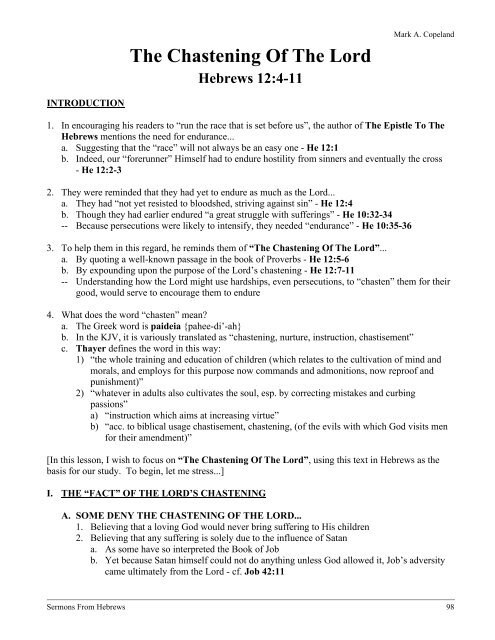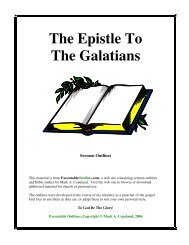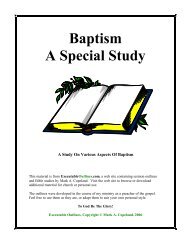The Epistle To The Hebrews - Executable Outlines
The Epistle To The Hebrews - Executable Outlines
The Epistle To The Hebrews - Executable Outlines
Create successful ePaper yourself
Turn your PDF publications into a flip-book with our unique Google optimized e-Paper software.
INTRODUCTION<br />
<strong>The</strong> Chastening Of <strong>The</strong> Lord<br />
<strong>Hebrews</strong> 12:4-11<br />
Mark A. Copeland<br />
1. In encouraging his readers to “run the race that is set before us”, the author of <strong>The</strong> <strong>Epistle</strong> <strong>To</strong> <strong>The</strong><br />
<strong>Hebrews</strong> mentions the need for endurance...<br />
a. Suggesting that the “race” will not always be an easy one - He 12:1<br />
b. Indeed, our “forerunner” Himself had to endure hostility from sinners and eventually the cross<br />
- He 12:2-3<br />
2. <strong>The</strong>y were reminded that they had yet to endure as much as the Lord...<br />
a. <strong>The</strong>y had “not yet resisted to bloodshed, striving against sin” - He 12:4<br />
b. Though they had earlier endured “a great struggle with sufferings” - He 10:32-34<br />
-- Because persecutions were likely to intensify, they needed “endurance” - He 10:35-36<br />
3. <strong>To</strong> help them in this regard, he reminds them of “<strong>The</strong> Chastening Of <strong>The</strong> Lord”...<br />
a. By quoting a well-known passage in the book of Proverbs - He 12:5-6<br />
b. By expounding upon the purpose of the Lord’s chastening - He 12:7-11<br />
-- Understanding how the Lord might use hardships, even persecutions, to “chasten” them for their<br />
good, would serve to encourage them to endure<br />
4. What does the word “chasten” mean?<br />
a. <strong>The</strong> Greek word is paideia {pahee-di’-ah}<br />
b. In the KJV, it is variously translated as “chastening, nurture, instruction, chastisement”<br />
c. Thayer defines the word in this way:<br />
1) “the whole training and education of children (which relates to the cultivation of mind and<br />
morals, and employs for this purpose now commands and admonitions, now reproof and<br />
punishment)”<br />
2) “whatever in adults also cultivates the soul, esp. by correcting mistakes and curbing<br />
passions”<br />
a) “instruction which aims at increasing virtue”<br />
b) “acc. to biblical usage chastisement, chastening, (of the evils with which God visits men<br />
for their amendment)”<br />
[In this lesson, I wish to focus on “<strong>The</strong> Chastening Of <strong>The</strong> Lord”, using this text in <strong>Hebrews</strong> as the<br />
basis for our study. <strong>To</strong> begin, let me stress...]<br />
I. THE “FACT” OF THE LORD’S CHASTENING<br />
A. SOME DENY THE CHASTENING OF THE LORD...<br />
1. Believing that a loving God would never bring suffering to His children<br />
2. Believing that any suffering is solely due to the influence of Satan<br />
a. As some have so interpreted the Book of Job<br />
b. Yet because Satan himself could not do anything unless God allowed it, Job’s adversity<br />
came ultimately from the Lord - cf. Job 42:11<br />
Sermons From <strong>Hebrews</strong> 98

















